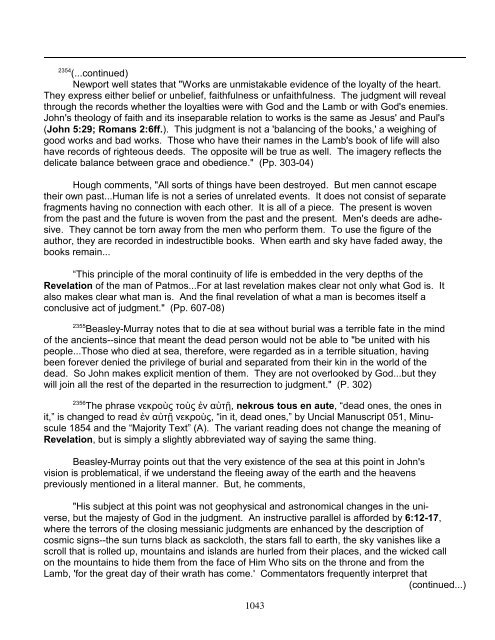Revelation 20 - In Depth Bible Commentaries
Revelation 20 - In Depth Bible Commentaries
Revelation 20 - In Depth Bible Commentaries
You also want an ePaper? Increase the reach of your titles
YUMPU automatically turns print PDFs into web optimized ePapers that Google loves.
2354<br />
(...continued)<br />
Newport well states that "Works are unmistakable evidence of the loyalty of the heart.<br />
They express either belief or unbelief, faithfulness or unfaithfulness. The judgment will reveal<br />
through the records whether the loyalties were with God and the Lamb or with God's enemies.<br />
John's theology of faith and its inseparable relation to works is the same as Jesus' and Paul's<br />
(John 5:29; Romans 2:6ff.). This judgment is not a 'balancing of the books,' a weighing of<br />
good works and bad works. Those who have their names in the Lamb's book of life will also<br />
have records of righteous deeds. The opposite will be true as well. The imagery reflects the<br />
delicate balance between grace and obedience." (Pp. 303-04)<br />
Hough comments, "All sorts of things have been destroyed. But men cannot escape<br />
their own past...Human life is not a series of unrelated events. It does not consist of separate<br />
fragments having no connection with each other. It is all of a piece. The present is woven<br />
from the past and the future is woven from the past and the present. Men's deeds are adhesive.<br />
They cannot be torn away from the men who perform them. To use the figure of the<br />
author, they are recorded in indestructible books. When earth and sky have faded away, the<br />
books remain...<br />
“This principle of the moral continuity of life is embedded in the very depths of the<br />
<strong>Revelation</strong> of the man of Patmos...For at last revelation makes clear not only what God is. It<br />
also makes clear what man is. And the final revelation of what a man is becomes itself a<br />
conclusive act of judgment." (Pp. 607-08)<br />
2355<br />
Beasley-Murray notes that to die at sea without burial was a terrible fate in the mind<br />
of the ancients--since that meant the dead person would not be able to "be united with his<br />
people...Those who died at sea, therefore, were regarded as in a terrible situation, having<br />
been forever denied the privilege of burial and separated from their kin in the world of the<br />
dead. So John makes explicit mention of them. They are not overlooked by God...but they<br />
will join all the rest of the departed in the resurrection to judgment." (P. 302)<br />
2356<br />
The phrase íåêñïò ôïò í áô, nekrous tous en aute, “dead ones, the ones in<br />
it,” is changed to read í áô íåêñïò, “in it, dead ones,” by Uncial Manuscript 051, Minuscule<br />
1854 and the “Majority Text” (A). The variant reading does not change the meaning of<br />
<strong>Revelation</strong>, but is simply a slightly abbreviated way of saying the same thing.<br />
Beasley-Murray points out that the very existence of the sea at this point in John's<br />
vision is problematical, if we understand the fleeing away of the earth and the heavens<br />
previously mentioned in a literal manner. But, he comments,<br />
"His subject at this point was not geophysical and astronomical changes in the universe,<br />
but the majesty of God in the judgment. An instructive parallel is afforded by 6:12-17,<br />
where the terrors of the closing messianic judgments are enhanced by the description of<br />
cosmic signs--the sun turns black as sackcloth, the stars fall to earth, the sky vanishes like a<br />
scroll that is rolled up, mountains and islands are hurled from their places, and the wicked call<br />
on the mountains to hide them from the face of Him Who sits on the throne and from the<br />
Lamb, 'for the great day of their wrath has come.' Commentators frequently interpret that<br />
(continued...)<br />
1043

















